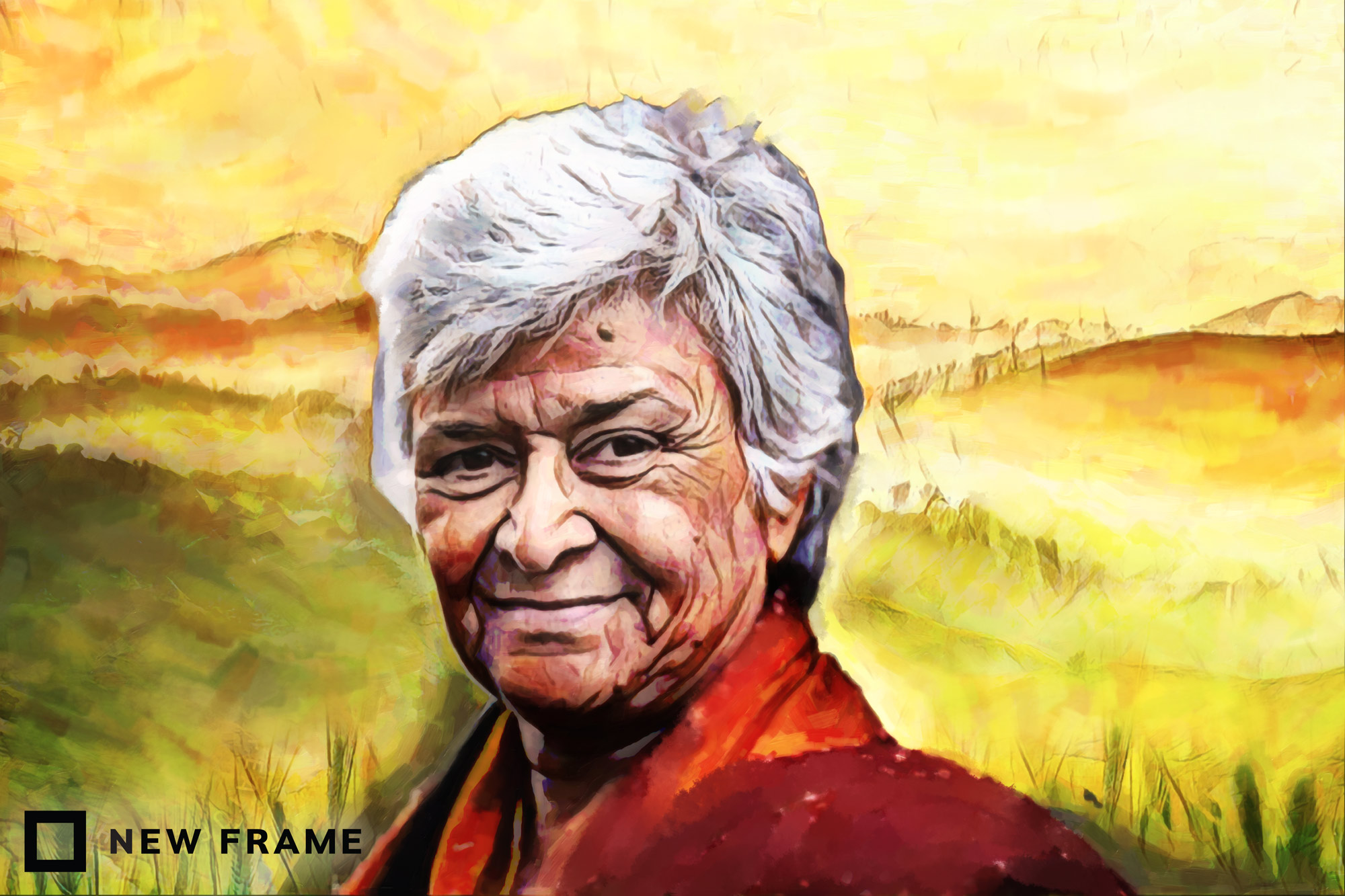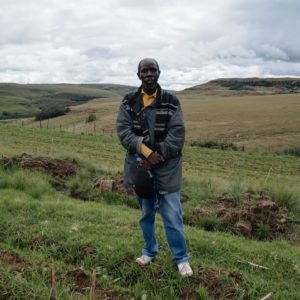South Asian feminists mourn death of Kamla Bhasin
An outspoken campaigner for women’s rights in a profoundly conservative Indian society, she fought patriarchy and gender inequality in a direct and hands-on manner.
Author:
7 October 2021

Kamla Bhasin, India’s trailblazing feminist activist, poet and writer, died on 25 September in New Delhi after a short battle with liver cancer. She was 75.
She emerged as a vociferous advocate of gender equality in the 1970s and spearheaded the campaign for gender equality in India at a time when taking up women rights issues was frowned upon. Apart from extensive written works, she leaves a legacy of community work through direct action and activism in a country that remains strictly orthodox and patriarchal.
Following Bhasin’s death, there was an outpouring of love and condolences, with many of her fellow campaigners expressing their admiration.
“Absolutely shocked and grieved to hear that our dearest Kamla Bhasin is no more with us,” wrote Kavita Krishnan, a prominent Indian activist who had worked with her. “How generous she was with sharing hope and song and friendship. What an unparalleled ability she had to express feminist politics in a language even a child could understand, and to change minds. Not an iota of arrogance, always willing to take criticism and reflect.”
Related article:
Rights activist Harsh Mander noted that Bhasin taught gender equality through words, actions, poetry, songs and storytelling and would remain a “massive influence” for many generations to come.
Save the Children India, which is part of the global child rights organisation, said Bhasin’s legacy would endure through her courageous writing and keep inspiring efforts towards gender equality.
“Through her songs and posters, she has reached out to millions of activists and energised protests … Using simple language to demystify concepts, she was able to [teach] the ideas of feminism and patriarchy to the lay person without jargon,” said a statement by Jagori, a Delhi-based resource collective for marginalised women that Bhasin set up with other feminists in 1984.
Related article:
Admiration for her work also poured in from neighbouring Pakistan. The Human Rights Commission of Pakistan (HRCP) said she was a South Asian citizen in the true sense of the word. “She embodied some of HRCP’s most cherished values: the struggle to protect democratic ideals, the resistance against patriarchy and, above all, the power of communities to mobilise for their rights.”
Pakistani activist Nadia Agha tweeted: “Today is a sad day for the women of the Global South. Social scientist, feminist activist and a stalwart of the women’s movement in India Kamla Bhasin passed away. She was an inspiration to many young feminists today, including me.”
Embracing the feminist cause
Born in 1946 in Shahidanwaali village in Punjab in present-day Pakistan, Bhasin’s family migrated to India and settled in Rajasthan state following the partition of the Indian subcontinent. She earned a master’s degree from Rajasthan University and went on to do a course in development sociology at Münster University in what was then West Germany.
On her return in 1972, she joined the Udaipur-based voluntary organisation Seva Mandir, which focused on rural development and women’s empowerment. It was through this grassroots work that she became a feminist.
“I increasingly found that among the poor, women were poorer. Among the Dalits, women were more Dalit. Among the excluded, women were more excluded,” Bhasin explained in a 2018 interview with India Development Review.
Related article:
She worked with the United Nations Food and Agriculture Organization from 1976 to 2001 before devoting herself fully to grassroots activism. She was the South Asian coordinator of the One Billion Rising campaign, a movement started by American playwright Eve Ensler to end violence against women.
In 1998, Bhasin also coordinated the creation of Sangat, a feminist network that works with underprivileged women from rural and traditional communities and is a project of Jagori.
“One of Kamla’s most endearing characteristics was her openness – to people and to viewpoints. She was not dogmatic and did not toe any particular party line. She truly listened to people and was even open to being told off,” said Kalpana Viswanath, one of her long-time associates at Jagori.
Activism through action and writing
Throughout the 1980s and 1990s, Bhasin was involved in important feminist campaigns in India. These ranged from rallies against dowry killings to demonstrations that resulted in reforms in the way rape and sexual assault were prosecuted.
She wrote extensively on patriarchy, representation and gender. Her published works have been translated into nearly 30 languages and include Laughing Matters (2005, co-authored with Bindia Thapar), Exploring Masculinity (2004), Borders & Boundaries: Women in India’s Partition (1998, co-authored with Ritu Menon), What Is Patriarchy? (1993) and Feminism and Its Relevance in South Asia (1986, co-authored with Nighat Said Khan).
Bhasin penned many pamphlets about feminism, patriarchy and violence that were widely translated, and laid the foundation for women’s studies in a number of organisations. She also established a name for herself as a creator of children’s rhymes. After discovering that most children’s books used gender stereotypes and prescribed gender roles, she decided to compose her own set of rhymes that mirrored the ways of a progressive household.
Related article:
She was an eloquent songwriter and used the medium to communicate feminist messaging through songs. The lyrics of one of her songs written in the early 1980s stated “Tod tod kay bandhanon ko dekho bahnain aati hain … Ayengi, zulm mitaengi (breaking the chains that bind them, see, the women have risen … They will be the ones to put an end to oppression)”. It was inspired by popular Punjabi folklore and quickly became a fixture at many feminist rallies. Bhasin is also known for her poem Kyunki main ladki hoon, mujhe padhna hai (Because I am a girl, I have to seek education), which champions the right to education for young girls.
Her work specifically focused on how patriarchy had promoted discrimination against women throughout history, and how this had taken on emerging cultural forms rather than being restricted to religious and traditional prohibitions. She argued that the feminist movement was not a battle between men and women, but rather a campaign against patriarchy’s philosophy.
Bhasin talked about the oppression of men under patriarchy and sought a more sensitive approach in tackling such issues. “Our men don’t need to change to support women, but to save themselves from being brutalised by centuries of exposure to patriarchy,” she argued in an interview in 2013. On religion, she said: “Often religion is used as a shield to justify patriarchy. When you question something, you are told, ‘yeh toh hamara sanskar hai, riwaaj hai (this is our culture, our traditions)’. And when this is done, it means logic has ended, belief has come in.”
Controversial position
In her writing and activism, Bhasin envisioned a feminist movement that transcended class, borders and other social and political divisions. In recent years, this perspective was criticised by some feminist contemporaries, who accused her of diminishing trans and Dalit feminism.
While she long spoke about the need to ensure the feminist movement in India included Dalit voices, in May 2021 she found herself at the heart of a controversy by saying feminism is “not about race, caste, trans rights or the ecology and so on, but entirely about the battle against patriarchy, misogyny and the domination of men and/over women”.
Related article:
She apologised for her remarks after it was pointed out that her view of gender here was not the most inclusive. “We come from diverse locations of caste, disability, sexual orientation, genders, race and class and I believe in sensitivity, recognition and respect for the diversity and multiplicity of feminisms. Feminism to me is about continuous learning and listening to each and every person. I will not try to explain the clips being circulated, but rather step back, reflect, learn and understand,” she said.
Despite being chastised for her ideas in the context of changing cultural atitudes and narratives on gender rights, Bhasin’s contributions to the South Asian feminist movement are undeniably significant and she is admired not only in India, but across South Asia.
She is survived by her son Jeet Bhasin, 41, who has cerebral palsy and is dependent on caregivers.





